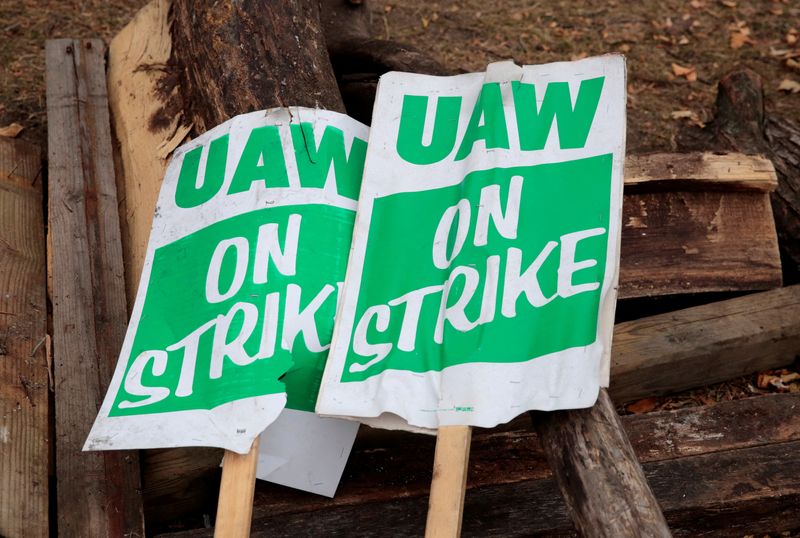By David Shepardson
(Reuters) -A first-ever simultaneous strike at the Detroit Three carmakers by the United Auto Workers grew all but certain on Thursday with little progress reported in talks hours before a contract deadline expires.
The union - which represents 146,000 U.S. auto workers - is asking for 40% pay raises through September 2027 and major improvements in benefits as part of what it calls "audacious" demands.
The UAW has outlined plans for a series of strikes targeting individual, undisclosed U.S. auto plants if agreements are not reached by 11:59 pm ET Thursday, rather than a full walkout. The union plans to disclose the initial plants during a 10 p.m. ET event.
Ford Motor (NYSE:F) CEO Jim Farley told CNN the proposal to hike wages by 40% would "put us out of business." He said there were no talks going on, and that the automaker has received no counteroffer to its plan to offer 20% pay hikes.
U.S. President Joe Biden on Thursday spoke with UAW President Shawn Fain and leaders of the car companies to discuss the status of negotiations, the White House said.
Just 10 days ago, Biden had expressed optimism that a strike could be averted, saying: "I'm not worried about a strike ... I don't think it's going to happen."
General Motors (NYSE:GM) earlier said it hiked its contract offer to a 20% wage hike for U.S. autoworkers over four and a half years - including 10% in the first year - to avoid a strike that is set to begin at midnight if no deal is reached.
GM CEO Mary Barra told employees the company still hoped to reach a deal: "Remember: we had a strike in 2019 and nobody won." GM reported a $3.6 billion pre-tax loss in 2019 after the 42-day walkout.
The third Detroit automaker, Chrysler parent Stellantis (NYSE:STLA), has offered pay hikes of 17.5%, the union has said.
Coordinated strikes would represent arguably the most ambitious U.S. labor action in decades and could impact U.S. economic growth, depending on how long they last.
The UAW's demands include restoring defined benefit pensions for all workers, 32-hour work weeks and additional cost-of-living hikes, as well as job security guarantees and an end to the use of temporary workers.
Ford's Farley said if the UAW proposal had already been in effect the company would have lost about $15 billion from 2019-2022 instead of earning about $30 billion and "gone bankrupt by now."
He criticized the lack of talks Thursday. "Nothing is going on," he told CNBC.
The UAW responded to the comments on social media saying Farley "made $21 million last year."
'DISASTROUS OUTCOME'
The UAW's Fain said Wednesday a strike was likely as automakers rejected the pension, 32-hour work week and other benefit improvements sought. He also criticized proposed changes to profit sharing that would cut payments to workers.
UAW organizing director Brian O. Shepherd said in an online event Thursday that the strike strategy is to give "negotiators maximum flexibility" to get autoworkers "the contract they deserve." He added a full walkout "is still on the table."
Fain has said the pay raises offered by the Detroit Three to auto workers were inadequate even as automakers said the union had yet to formally respond to their latest, more generous offers.
"The clear winner in this Game of Thrones Battle between the UAW vs. GM/Ford is Tesla (NASDAQ:TSLA)," said Wedbush analyst Daniel Ives. The Detroit automakers could face higher costs and complexity in the future that Tesla and other non-union automakers will not face as they expand electric vehicle production, he said.
AID FOR SUPPLIERS
The U.S. auto sector, including parts manufacturers, employs almost 1 million people, according to the U.S. Bureau of Labor Statistics.
Biden administration officials are discussing emergency aid to protect smaller firms that supply U.S. auto manufacturers, according to a source with knowledge of the matter. The White House declined to comment.
Fain outlined a strategy to "create confusion" with a series of work stoppages targeting individual U.S. plants if no deal is reached.
Stopping work at a key engine or transmission plant, for example, could have a cascading effect by depriving other factories of parts they need to produce vehicles. Another option would be to strike at profitable pickup truck or SUV assembly plants.
Fain said it was still possible that at a later date all of the auto workers could strike.
A full strike would hit earnings at each affected automaker by about $400 million to $500 million per week assuming all production was lost, Deutsche Bank has estimated.

Some losses could be recouped by boosting production schedules after a strike, but that possibility fades as a strike extends to weeks or months. A UAW strike would not affect European and Asian carmakers like Toyota (NYSE:TM), Honda (NYSE:HMC) and Mercedes, whose U.S. plant workers are not represented by the union.
The UAW said it was planning a rally in Detroit on Friday that will include Fain, Senator Bernie Sanders and other members of Congress, coinciding with a first of day of expected walkouts.
